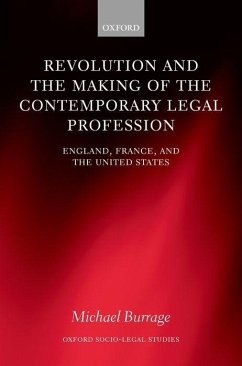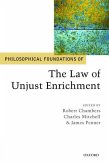Michael Burrage
Revolution and the Making of the Contemporary Legal Profession
England, France, and the United States
Michael Burrage
Revolution and the Making of the Contemporary Legal Profession
England, France, and the United States
- Gebundenes Buch
- Merkliste
- Auf die Merkliste
- Bewerten Bewerten
- Teilen
- Produkt teilen
- Produkterinnerung
- Produkterinnerung
Examining the social revolutions in France, the United States, and England during industrialization this book looks at the different ways in which social upheaval has prompted radical divergences in the organisation and regulation of the legal profession.
Andere Kunden interessierten sich auch für
![Philosophical Foundations of the Law of Unjust Enrichment Philosophical Foundations of the Law of Unjust Enrichment]() Philosophical Foundations of the Law of Unjust Enrichment173,99 €
Philosophical Foundations of the Law of Unjust Enrichment173,99 €![The Legal System Between Order and Disorder The Legal System Between Order and Disorder]() Francois OstThe Legal System Between Order and Disorder145,99 €
Francois OstThe Legal System Between Order and Disorder145,99 €![The American Revolution in the Law The American Revolution in the Law]() Shannon C StimsonThe American Revolution in the Law111,99 €
Shannon C StimsonThe American Revolution in the Law111,99 €![Causation and Responsibility Causation and Responsibility]() Michael S MooreCausation and Responsibility200,99 €
Michael S MooreCausation and Responsibility200,99 €![The Advocate General and EC Law The Advocate General and EC Law]() Noreen BurrowsThe Advocate General and EC Law136,99 €
Noreen BurrowsThe Advocate General and EC Law136,99 €![Patterns of American Jurisprudence Patterns of American Jurisprudence]() Neil DuxburyPatterns of American Jurisprudence184,99 €
Neil DuxburyPatterns of American Jurisprudence184,99 €![Offences and Defences Offences and Defences]() John GardnerOffences and Defences175,99 €
John GardnerOffences and Defences175,99 €-
-
-
Examining the social revolutions in France, the United States, and England during industrialization this book looks at the different ways in which social upheaval has prompted radical divergences in the organisation and regulation of the legal profession.
Produktdetails
- Produktdetails
- Verlag: Oxford University Press (UK)
- Seitenzahl: 696
- Erscheinungstermin: 11. Mai 2006
- Englisch
- Abmessung: 234mm x 156mm x 38mm
- Gewicht: 1143g
- ISBN-13: 9780199282982
- ISBN-10: 0199282986
- Artikelnr.: 21879248
- Herstellerkennzeichnung
- Libri GmbH
- Europaallee 1
- 36244 Bad Hersfeld
- gpsr@libri.de
- Verlag: Oxford University Press (UK)
- Seitenzahl: 696
- Erscheinungstermin: 11. Mai 2006
- Englisch
- Abmessung: 234mm x 156mm x 38mm
- Gewicht: 1143g
- ISBN-13: 9780199282982
- ISBN-10: 0199282986
- Artikelnr.: 21879248
- Herstellerkennzeichnung
- Libri GmbH
- Europaallee 1
- 36244 Bad Hersfeld
- gpsr@libri.de
Michael Burrage, Research Fellow in Industrial Relations, London School of Economics and Political Science
1: Investigating a Fateful Encounter
Utopian Ideals and Revolutionary Practice
Two Contested and Honorific Concepts - Revolution and Profession
Why Do Professionals Behave the Way They Do?
What Have They Actually Done, or Tried To Do?
The Framework of the Investigation, the Evidence and its Presentation
2: Ideal and Myth in the Lives of French Advocates
The Formation of a State and of a Profession
Reconsidering the 'Triumph of the Professionals'
...And the 'Demise' of Advocates Before the Revolution
The Original Revolutionary Design: Act I
Terror and Thermidor: Act II
Napoleon's Selections, Innovations, and Synthesis: Act III
Return of the Advocates and Their Orders
Why was the Profession Destroyed?
Cycles of Constitutionalism, Repression, and Revolution
Bourbon Beginnings 1815 - 30
Orleanist Reprise 1830 - 48
Napoleanic Coda 1848 - 70
The Original Revolutionary Design Re-Enacted, Paris 1871
Marx's Nightmare and Tocqueville's Theatre
A Protracted and Reluctant Return to Normalcy
Schools, Stage, and Invisible Barriers
A Jurisdiction Defined by Incompatibilités and Plaidoiries
Alter Ego Tries to Change Advocates' Behaviour
Three Threats to Absolute Independence
An Anachronistic Sense of Humour
Myth and Irony in the Career of a Super-Profession
3: Practitioners vs. Legislators and Professors in the United States
A Journey from Utopia Back to England - Lawyers in the Colonies
The Revolution Controlled, for the Most Part
The Massachusetts Electorate Interprets the Revolution
Other States, Other Interpretations
Removing Restrictions on Legal Practice
The Collapse of Bar Associations and the Philadelphia Exception
Elected Judges and Codes Complete Americanization
Was it Capitalism, the Frontier or the Revolution?
Three Stages of Reconstruction
What had Changed During the Interregnum?
Practitioners vs. Professors and Legislators
Practitioners Search for an Effective Form of Government
An Undependable Ally: the Judiciary
Aother Undependable Ally: the Law Schools
Explaining Unethical and Innovative Behaviour
An Asymmetrical and Ever-Expanding Jurisdiction
How a 'Body' Became a Ladder
Failure or Success? Some Clues from Philadelphia
4: Learned Friends and Gentlemen in England - Beneficiaries of the Glorious Revolution
Confused Candidates in a Marketplace
Strange Bodies - the Inns Before the Revolution
The Trauma and the Tremor
Searching the Inns and the Courts
Explaining the Failure of the Revolutionary Movement
An Infrastructure of Absolutism is Created by Writs
...And Destroyed by 'the Greatest Thing Done by the English Nation'
The Medieval Corporation then Advances into the Modern World
Pupillages and Articles
Hedges, Honour and Markets
Little Republics, Little Commonwealths
Spinning Webs of Mutual Restraint
Status Rivals and Allies
Industrialization, Democracy, and the Unwritten Constitution
Is Professional Power an Adequate Explanation?
Thatcher and a Turbulent Tercentenary
The Discrediting of Self-Governing Communities
5: Comparing Professions and Societies
The Kinship of Old Regime Lawyers
Facing Common Revolutionary Aspirations
Diverging Paths into the Modern World
An Unmistakeable and Inconvenient Conclusion
An Ancien Régime Guide to French Modernity
A Slice of the American Dream
M'Learned Friends Illustrate Englishness
Utopian Ideals and Revolutionary Practice
Two Contested and Honorific Concepts - Revolution and Profession
Why Do Professionals Behave the Way They Do?
What Have They Actually Done, or Tried To Do?
The Framework of the Investigation, the Evidence and its Presentation
2: Ideal and Myth in the Lives of French Advocates
The Formation of a State and of a Profession
Reconsidering the 'Triumph of the Professionals'
...And the 'Demise' of Advocates Before the Revolution
The Original Revolutionary Design: Act I
Terror and Thermidor: Act II
Napoleon's Selections, Innovations, and Synthesis: Act III
Return of the Advocates and Their Orders
Why was the Profession Destroyed?
Cycles of Constitutionalism, Repression, and Revolution
Bourbon Beginnings 1815 - 30
Orleanist Reprise 1830 - 48
Napoleanic Coda 1848 - 70
The Original Revolutionary Design Re-Enacted, Paris 1871
Marx's Nightmare and Tocqueville's Theatre
A Protracted and Reluctant Return to Normalcy
Schools, Stage, and Invisible Barriers
A Jurisdiction Defined by Incompatibilités and Plaidoiries
Alter Ego Tries to Change Advocates' Behaviour
Three Threats to Absolute Independence
An Anachronistic Sense of Humour
Myth and Irony in the Career of a Super-Profession
3: Practitioners vs. Legislators and Professors in the United States
A Journey from Utopia Back to England - Lawyers in the Colonies
The Revolution Controlled, for the Most Part
The Massachusetts Electorate Interprets the Revolution
Other States, Other Interpretations
Removing Restrictions on Legal Practice
The Collapse of Bar Associations and the Philadelphia Exception
Elected Judges and Codes Complete Americanization
Was it Capitalism, the Frontier or the Revolution?
Three Stages of Reconstruction
What had Changed During the Interregnum?
Practitioners vs. Professors and Legislators
Practitioners Search for an Effective Form of Government
An Undependable Ally: the Judiciary
Aother Undependable Ally: the Law Schools
Explaining Unethical and Innovative Behaviour
An Asymmetrical and Ever-Expanding Jurisdiction
How a 'Body' Became a Ladder
Failure or Success? Some Clues from Philadelphia
4: Learned Friends and Gentlemen in England - Beneficiaries of the Glorious Revolution
Confused Candidates in a Marketplace
Strange Bodies - the Inns Before the Revolution
The Trauma and the Tremor
Searching the Inns and the Courts
Explaining the Failure of the Revolutionary Movement
An Infrastructure of Absolutism is Created by Writs
...And Destroyed by 'the Greatest Thing Done by the English Nation'
The Medieval Corporation then Advances into the Modern World
Pupillages and Articles
Hedges, Honour and Markets
Little Republics, Little Commonwealths
Spinning Webs of Mutual Restraint
Status Rivals and Allies
Industrialization, Democracy, and the Unwritten Constitution
Is Professional Power an Adequate Explanation?
Thatcher and a Turbulent Tercentenary
The Discrediting of Self-Governing Communities
5: Comparing Professions and Societies
The Kinship of Old Regime Lawyers
Facing Common Revolutionary Aspirations
Diverging Paths into the Modern World
An Unmistakeable and Inconvenient Conclusion
An Ancien Régime Guide to French Modernity
A Slice of the American Dream
M'Learned Friends Illustrate Englishness
1: Investigating a Fateful Encounter
Utopian Ideals and Revolutionary Practice
Two Contested and Honorific Concepts - Revolution and Profession
Why Do Professionals Behave the Way They Do?
What Have They Actually Done, or Tried To Do?
The Framework of the Investigation, the Evidence and its Presentation
2: Ideal and Myth in the Lives of French Advocates
The Formation of a State and of a Profession
Reconsidering the 'Triumph of the Professionals'
...And the 'Demise' of Advocates Before the Revolution
The Original Revolutionary Design: Act I
Terror and Thermidor: Act II
Napoleon's Selections, Innovations, and Synthesis: Act III
Return of the Advocates and Their Orders
Why was the Profession Destroyed?
Cycles of Constitutionalism, Repression, and Revolution
Bourbon Beginnings 1815 - 30
Orleanist Reprise 1830 - 48
Napoleanic Coda 1848 - 70
The Original Revolutionary Design Re-Enacted, Paris 1871
Marx's Nightmare and Tocqueville's Theatre
A Protracted and Reluctant Return to Normalcy
Schools, Stage, and Invisible Barriers
A Jurisdiction Defined by Incompatibilités and Plaidoiries
Alter Ego Tries to Change Advocates' Behaviour
Three Threats to Absolute Independence
An Anachronistic Sense of Humour
Myth and Irony in the Career of a Super-Profession
3: Practitioners vs. Legislators and Professors in the United States
A Journey from Utopia Back to England - Lawyers in the Colonies
The Revolution Controlled, for the Most Part
The Massachusetts Electorate Interprets the Revolution
Other States, Other Interpretations
Removing Restrictions on Legal Practice
The Collapse of Bar Associations and the Philadelphia Exception
Elected Judges and Codes Complete Americanization
Was it Capitalism, the Frontier or the Revolution?
Three Stages of Reconstruction
What had Changed During the Interregnum?
Practitioners vs. Professors and Legislators
Practitioners Search for an Effective Form of Government
An Undependable Ally: the Judiciary
Aother Undependable Ally: the Law Schools
Explaining Unethical and Innovative Behaviour
An Asymmetrical and Ever-Expanding Jurisdiction
How a 'Body' Became a Ladder
Failure or Success? Some Clues from Philadelphia
4: Learned Friends and Gentlemen in England - Beneficiaries of the Glorious Revolution
Confused Candidates in a Marketplace
Strange Bodies - the Inns Before the Revolution
The Trauma and the Tremor
Searching the Inns and the Courts
Explaining the Failure of the Revolutionary Movement
An Infrastructure of Absolutism is Created by Writs
...And Destroyed by 'the Greatest Thing Done by the English Nation'
The Medieval Corporation then Advances into the Modern World
Pupillages and Articles
Hedges, Honour and Markets
Little Republics, Little Commonwealths
Spinning Webs of Mutual Restraint
Status Rivals and Allies
Industrialization, Democracy, and the Unwritten Constitution
Is Professional Power an Adequate Explanation?
Thatcher and a Turbulent Tercentenary
The Discrediting of Self-Governing Communities
5: Comparing Professions and Societies
The Kinship of Old Regime Lawyers
Facing Common Revolutionary Aspirations
Diverging Paths into the Modern World
An Unmistakeable and Inconvenient Conclusion
An Ancien Régime Guide to French Modernity
A Slice of the American Dream
M'Learned Friends Illustrate Englishness
Utopian Ideals and Revolutionary Practice
Two Contested and Honorific Concepts - Revolution and Profession
Why Do Professionals Behave the Way They Do?
What Have They Actually Done, or Tried To Do?
The Framework of the Investigation, the Evidence and its Presentation
2: Ideal and Myth in the Lives of French Advocates
The Formation of a State and of a Profession
Reconsidering the 'Triumph of the Professionals'
...And the 'Demise' of Advocates Before the Revolution
The Original Revolutionary Design: Act I
Terror and Thermidor: Act II
Napoleon's Selections, Innovations, and Synthesis: Act III
Return of the Advocates and Their Orders
Why was the Profession Destroyed?
Cycles of Constitutionalism, Repression, and Revolution
Bourbon Beginnings 1815 - 30
Orleanist Reprise 1830 - 48
Napoleanic Coda 1848 - 70
The Original Revolutionary Design Re-Enacted, Paris 1871
Marx's Nightmare and Tocqueville's Theatre
A Protracted and Reluctant Return to Normalcy
Schools, Stage, and Invisible Barriers
A Jurisdiction Defined by Incompatibilités and Plaidoiries
Alter Ego Tries to Change Advocates' Behaviour
Three Threats to Absolute Independence
An Anachronistic Sense of Humour
Myth and Irony in the Career of a Super-Profession
3: Practitioners vs. Legislators and Professors in the United States
A Journey from Utopia Back to England - Lawyers in the Colonies
The Revolution Controlled, for the Most Part
The Massachusetts Electorate Interprets the Revolution
Other States, Other Interpretations
Removing Restrictions on Legal Practice
The Collapse of Bar Associations and the Philadelphia Exception
Elected Judges and Codes Complete Americanization
Was it Capitalism, the Frontier or the Revolution?
Three Stages of Reconstruction
What had Changed During the Interregnum?
Practitioners vs. Professors and Legislators
Practitioners Search for an Effective Form of Government
An Undependable Ally: the Judiciary
Aother Undependable Ally: the Law Schools
Explaining Unethical and Innovative Behaviour
An Asymmetrical and Ever-Expanding Jurisdiction
How a 'Body' Became a Ladder
Failure or Success? Some Clues from Philadelphia
4: Learned Friends and Gentlemen in England - Beneficiaries of the Glorious Revolution
Confused Candidates in a Marketplace
Strange Bodies - the Inns Before the Revolution
The Trauma and the Tremor
Searching the Inns and the Courts
Explaining the Failure of the Revolutionary Movement
An Infrastructure of Absolutism is Created by Writs
...And Destroyed by 'the Greatest Thing Done by the English Nation'
The Medieval Corporation then Advances into the Modern World
Pupillages and Articles
Hedges, Honour and Markets
Little Republics, Little Commonwealths
Spinning Webs of Mutual Restraint
Status Rivals and Allies
Industrialization, Democracy, and the Unwritten Constitution
Is Professional Power an Adequate Explanation?
Thatcher and a Turbulent Tercentenary
The Discrediting of Self-Governing Communities
5: Comparing Professions and Societies
The Kinship of Old Regime Lawyers
Facing Common Revolutionary Aspirations
Diverging Paths into the Modern World
An Unmistakeable and Inconvenient Conclusion
An Ancien Régime Guide to French Modernity
A Slice of the American Dream
M'Learned Friends Illustrate Englishness









